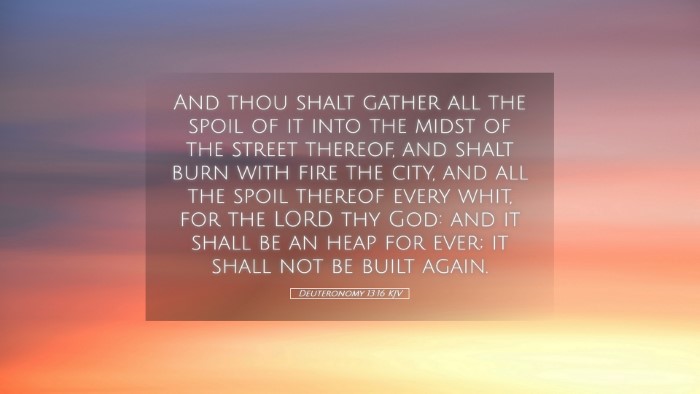Commentary on Deuteronomy 13:16
Verse Context: Deuteronomy 13:16 states, "And thou shalt gather all the spoil of it into the midst of the street thereof, and shalt burn with fire the city, and all the spoil thereof every whit, for the Lord thy God: and it shall be a heap for ever; it shall not be built again." This verse is situated within a section concerning the prohibition of idolatry and the severe consequences for those who entice others to worship false gods, signifying the importance of maintaining purity in worship and allegiance to God.
Exegesis and Interpretation
This passage is part of a larger discourse in Deuteronomy where God provides instructions to Moses for the Israelites concerning their conduct in the Promised Land. The radical implications of this instruction against idolatry reveal God’s absolute intolerance towards any form of rebellion against His divine sovereignty.
Matthew Henry's Commentary
Matthew Henry emphasizes that the command to destroy the city and its spoils represents God's judgment against sin and idolatry. He notes that the severity of the action reflects the seriousness with which God must be viewed. Henry elaborates on the importance of removing all vestiges of idolatry, indicating that lingering remains can lead to temptation and eventual apostasy.
- Idolatry as a Social Disease: Henry likens idolatry to a contagious disease that, if not entirely eradicated, could infect the community, thus underlining the need for communal purity in worship.
- Devotion to God's Commands: He reminds readers that their actions should align with their devotion to God, drawing out the principle that true obedience requires total commitment to maintaining God’s standards.
Albert Barnes' Commentary
Albert Barnes underscores the procedural aspects of the command, noting that the Israelites are instructed to gather the spoils and burn everything associated with the city that has turned toward idolatry. His commentary delves into the judicial nature of this decree, pointing out that it served to reinforce the seriousness of disloyalty to God.
- The Role of Community: Barnes emphasizes the communal aspect of the punishment, encouraging the community to take part in the execution of God's judgment as a collective responsibility for their loyalty to God.
- Symbolism of Fire: He explores the symbolism of fire as a purifying force, suggesting that burning the city serves not only as a punishment but as a means of restoration for Israel, purging them of sin and redirecting their hearts to God.
Adam Clarke's Commentary
Adam Clarke offers a detailed analysis of the phrase "for the Lord thy God," interpreting it as a reminder that the actions taken against idolatry must be rooted in the fear and reverence of God. Clarke notes the significance of complete destruction of idolatrous influence, suggesting that it was crucial not to possess any of the spoils lest they lead the faithful away from God.
- Consequences of Compromise: Clarke warns that even small allowances for idolatry can lead to greater transgressions, making clear that the Israelites must hold firm against any compromise in their dedication to God.
- Historical Context: He also contextualizes this command by referencing other nations that faced similar fates due to their idolatrous practices, highlighting God's justice as impartial among all peoples.
Theological Implications
The theological insights from this verse compel readers to consider the nature of God's holiness and His expectations for moral purity from His followers. The destruction of the city serves as a stark reminder that God will not tolerate divided loyalties and emphasizes the necessity for complete allegiance to Him.
Application for Today's Believers
This passage prompts contemporary believers to reflect on potential idolatrous influences in their own lives, whether they be material possessions, relationships, or ideologies that challenge their devotion to God. The drastic measures taken against idolatry encourage a proactive stance in maintaining spiritual purity—removing anything that could distract from a committed relationship with God.
Conclusion
In sum, Deuteronomy 13:16 serves not only as a historical narrative but as an enduring principle for spiritual integrity and fidelity in worship. The combined insights from Matthew Henry, Albert Barnes, and Adam Clarke underscore the imperative nature of this passage for understanding God’s expectations for His people and the lengths to which they must go to uphold their covenant relationship with Him.


